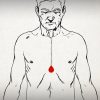Antiarrhythmics
Antiarrhythmics are medications that are used to help with heart rhythm problems. The main job of antiarrhythmics is to keep your heart beating at a steady rate. You might be given this medication after surgery, and usually your care team will have you stop taking it after about a month.
You may have a few side effects when taking antiarrhythmics like a slow heart rate, nausea, vomiting, constipation, muscle weakness, trouble with your vision, or a bad reaction to bright sunlight. You should call your doctor if your nausea or vomiting doesn’t stop, if you get dizzy or lightheaded, if you have trouble with your vision, if your skin turns yellowish, or if you have shortness of breath.
Three helpful tips when taking antiarrhythmics are:
- Use sunscreen when outside.
- If you are on this medication for more than six weeks, ask about lung and thyroid testing.
- Check your heart rate every day, and if it is below 60 beats per minute, call your doctor.
Remember, the goal is to get you well, and these medications can help with that. But if you have any questions or are worried about any of the side effects, please talk with your care team.



















































